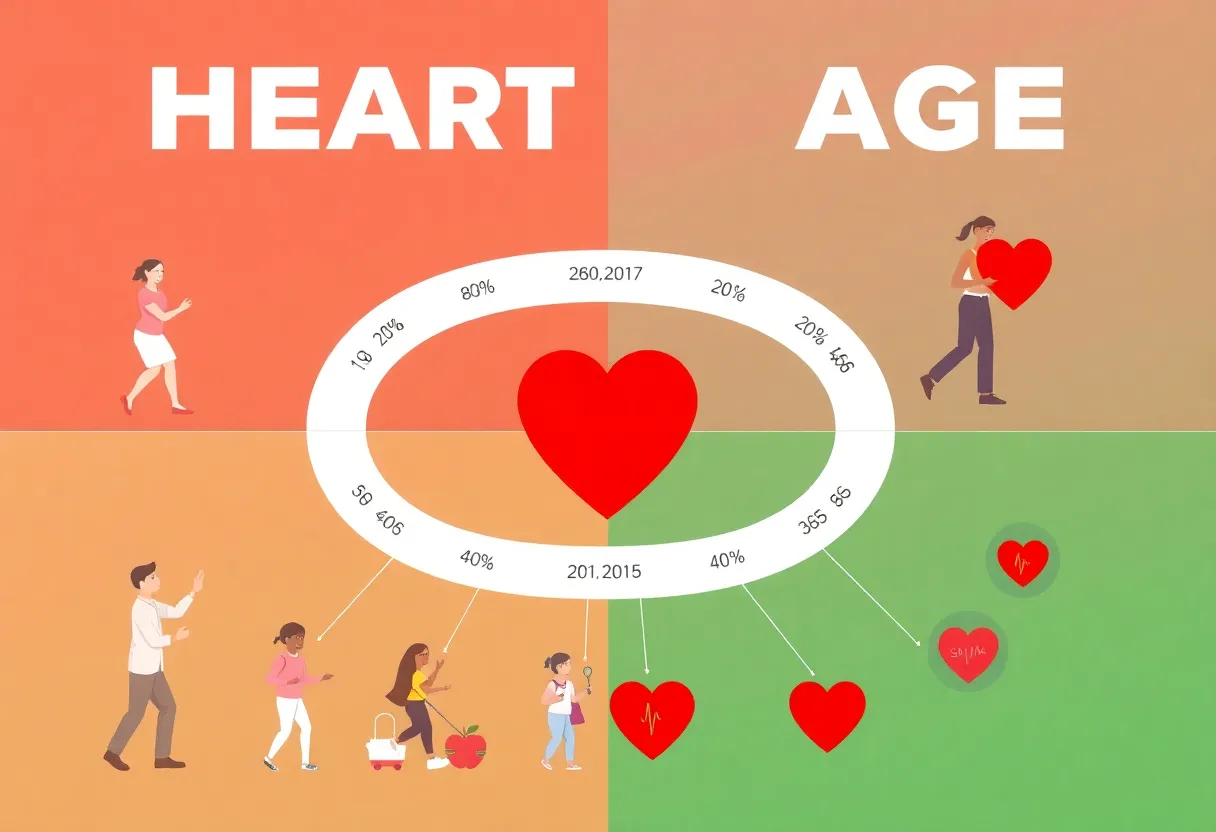News Summary
A new study from Northwestern Medicine highlights that many U.S. adults have a ‘heart age’ significantly older than their actual age, with disparities exceeding ten years in many cases. The findings were based on an analysis of over 14,000 adults aged 30 to 79 and reveal that men, lower-income individuals, and certain racial groups tend to have a greater gap between heart age and chronological age. Researchers emphasize the importance of understanding cardiovascular risks and have developed a free online calculator to help individuals assess their heart health.
Chicago, IL – A new study conducted by Northwestern Medicine reveals that many adults in the United States have a “heart age” significantly older than their actual chronological age, with discrepancies in some cases exceeding ten years. The findings, based on an extensive evaluation of over 14,000 U.S. adults aged between 30 and 79, will be published in JAMA Cardiology on July 30, 2025.
The research indicates that the difference between a person’s heart age and their actual age varies widely across demographics. Men, lower-income individuals, those with lower education levels, and Black or Hispanic adults tend to have a heart age that is several years older than their chronological age. For instance, Black men displayed an average heart age that is 8.5 years older than their actual age, while Black women showed an average of 6.2 years older. Hispanic men had a heart age 7.9 years greater, and Hispanic women showed a gap of 4.8 years.
In contrast, white men had an average heart age 6.4 years older than their chronological age, and white women averaged 3.7 years older. Asian men and women also showed disparities, with average heart ages 6.7 years and 2.8 years older than their actual ages, respectively.
The research highlights the importance of understanding cardiovascular risks, which are traditionally presented as percentages. Northwestern scientists have developed a free online calculator for individuals to assess their heart age based on various health factors, including blood pressure, cholesterol levels, smoking status, and diabetes prevalence. This personalized approach aims to enhance comprehension and facilitate better communication between doctors and patients regarding heart disease risk and preventive measures.
The findings raise concerns as heart disease continues to be the leading cause of death in the U.S. Despite advancements in public health, many adults are not receiving necessary preventive care. Approximately one-third of men with a high school education or less experienced a heart age more than ten years older than their actual age. The study emphasizes the need for increased awareness and action, particularly among younger adults, regarding heart disease risk.
Dr. Sadiya Khan, the lead author of the study, expressed optimism about the potential impact of the heart age calculator in fostering impactful discussions between healthcare providers and patients. She suggested that such discussions could help individuals recognize their health risks and inspire preventive action, ultimately leading to better health outcomes.
The heart age calculator, while an innovative tool, should not replace clinical care. It is important for individuals to consult with healthcare professionals about their cardiovascular health and potential risks. Further studies will explore whether framing heart disease risk in terms of heart age can enhance patients’ understanding and their engagement in preventive therapies.
The study, titled “PREVENT Risk Age Equations and Population Distribution in U.S. Adults,” aims to shift the conventional methods of conveying cardiovascular risk. By presenting risk in terms of a person’s heart age, researchers hope to empower individuals to take proactive steps towards better heart health.
As the study reveals significant gaps in heart health among various demographic groups, it underscores the importance of targeted interventions and heightened awareness of cardiovascular health risks in the U.S. population.
Deeper Dive: News & Info About This Topic
HERE Resources
Drinking Habits Linked to Stomach Aches, Experts Warn
Connecticut Advocates for National Mesothelioma Registry for Veterans
Severe Liver Toxicity Linked to Turmeric Supplements
Additional Resources
- The Washington Post: Heart Biological Age and Cardiovascular Disease
- STAT: Most Americans’ Hearts Older than Chronological Age
- Medical Xpress: Adults’ Hearts Older than Actual Age
- Today: Heart Age Study and Calculator
- BuzzFeed: Heart Cardiovascular Age
- Wikipedia: Heart Disease
- Google Search: Cardiovascular Disease
- Google Scholar: Heart Age Calculator
- Encyclopedia Britannica: Heart
- Google News: Heart Disease
Author: STAFF HERE BALTIMORE WRITER
The BALTIMORE STAFF WRITER represents the experienced team at HEREBaltimore.com, your go-to source for actionable local news and information in Baltimore, Baltimore County, and beyond. Specializing in "news you can use," we cover essential topics like product reviews for personal and business needs, local business directories, politics, real estate trends, neighborhood insights, and state news affecting the area—with deep expertise drawn from years of dedicated reporting and strong community input, including local press releases and business updates. We deliver top reporting on high-value events such as the Baltimore Book Festival, Preakness Stakes, and Artscape. Our coverage extends to key organizations like the Baltimore Chamber of Commerce and Visit Baltimore, plus leading businesses in shipping and healthcare that power the local economy such as the Port of Baltimore and Johns Hopkins Medicine. As part of the broader HERE network, we provide comprehensive, credible insights into Maryland's dynamic landscape.





